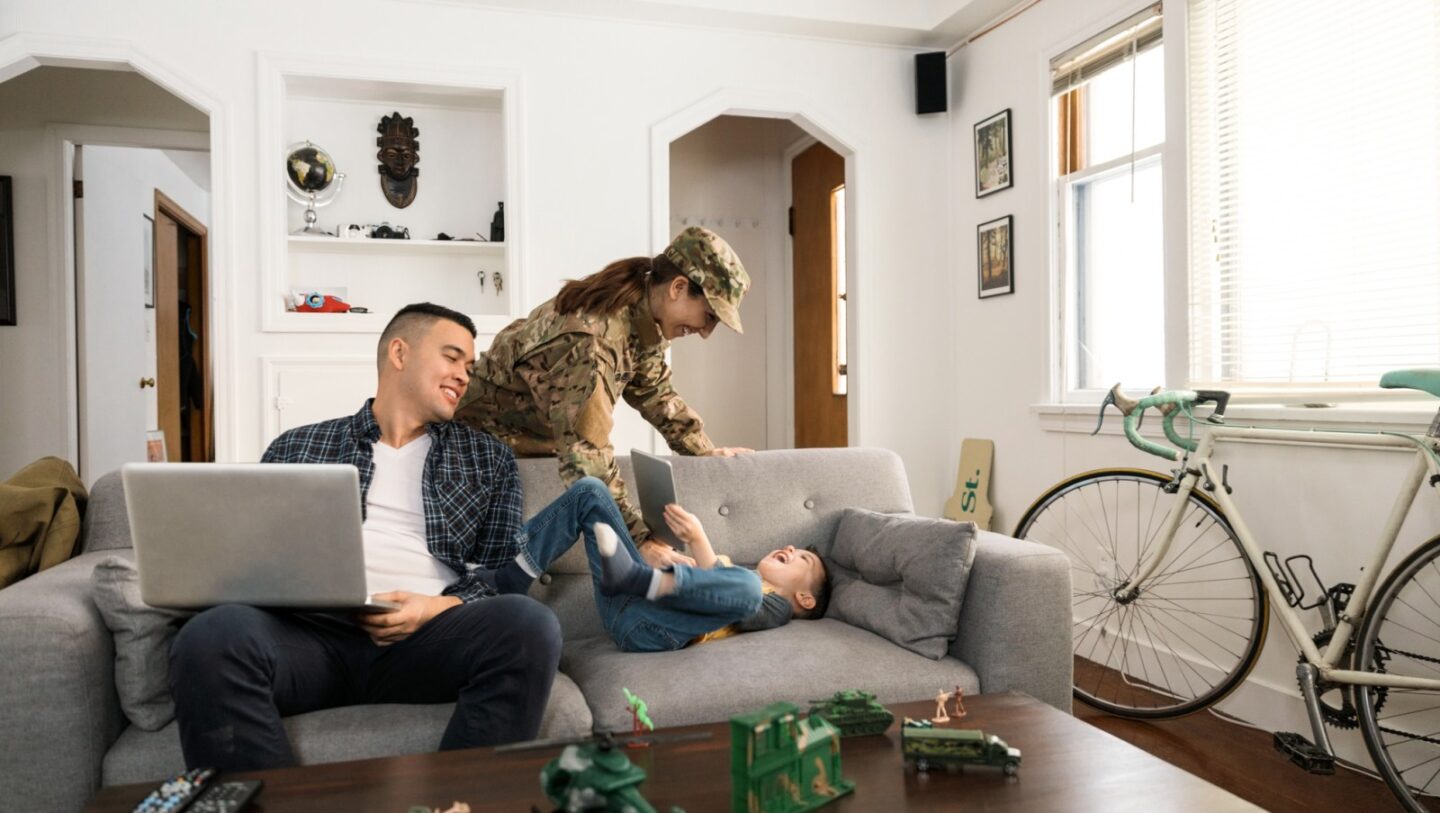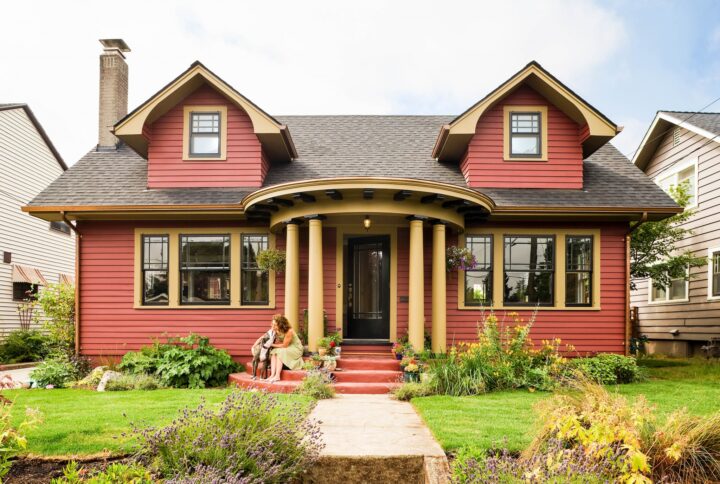VA Loan Closing Costs: What Fees Will You Pay?


Written by Jessica Rapp on April 29, 2024
When you buy or refinance a home with a VA loan, you’ll be responsible for paying closing costs. These are fees paid to your lender for processing and finalizing the details of your loan. While all loans carry some closing costs, there are a few fees that are specific to VA loans. Here’s what you need to know about VA loan closing costs.
Who pays closing costs on a VA loan?
VA loan closing costs are primarily paid by the buyer. Like with other types of home loans, the seller typically pays a few closing costs like real estate agent commissions and brokerage fees. In some states, the U.S. Department of Veterans Affairs (VA) may also require the seller to pay for a termite report. In addition, your lender may cover some of the VA loan closing costs that you would typically pay if you had a conventional loan, such as attorney fees or additional inspection fees.
If you’re looking to have more of your closing costs paid for, you can always apply for closing cost assistance, ask your lender for a credit or ask the seller to cover a portion of your closing costs when negotiating terms.
How much are VA loan closing costs?
VA loan closing costs for a home purchase can be between 1% and 5% of the total loan amount. That means for a $300,000 mortgage, VA closing costs could be anywhere from $3,000 to $15,000. According to the Consumer Financial Protection Bureau (CFPB), the average VA loan closing costs in 2021 were $8,391, while the average VA loan was valued at $354,474. You can use Zillow’s VA Mortgage Calculator to get an estimate of your mortgage payments to determine your potential closing costs.
How are VA loan closing costs different?
Unlike other mortgage types, VA loans don’t require mortgage insurance — even with 100% financing. No mortgage insurance means if a VA borrower puts down less than 20% or no down payment at all, they can potentially save between $1,800 and $2,400 a year in PMI costs on a $250,000 loan. Instead, VA borrowers pay a one-time funding fee that helps pay for all the great benefits the VA program provides.
In addition to no mortgage insurance requirements, you also only have to pay up to 1% of the loan amount in VA loan origination fees, and the seller can contribute up to 4% the loan amount in concessions to help cover your VA loan closing costs.
VA loan closing costs
Here are the closing costs that you, as the buyer, are responsible for when purchasing a home with a VA loan. If you’re considering a refinance, VA IRRRL closing costs are usually similar. There are few ways that you might be able to reduce the amount you have to pay at closing. Speak to a VA lender to learn more.
VA funding fee
A VA funding fee is required on all VA purchase and refinance loans. The funding fee is a one-time payment due at closing that can either be paid for upfront or financed into your loan. The amount you pay usually depends on whether it’s your first time using a VA loan, you’re a repeat borrower, you’re purchasing or refinancing a home or the size of your down payment. Some veterans may qualify for a funding fee exemption. Check with your lender to learn more about exemption requirements.
Cost: Funding fee percentages range from 0.5% to 3.6% of your total loan amount.
Origination fee
Your loan origination fee compensates the lender for opening and servicing your loan. On a VA loan, origination fees can’t exceed 1% of the loan amount. At closing, you’ll typically see a flat 1% origination fee, which covers costs associated with underwriting, locking in your interest rate, document preparation, appraisal costs, postage, notary fees and/or tax service fees. In 2021, the average origination costs on a VA loan were $1,403 according to the Consumer Financial Protection Bureau.
Cost: Expect to pay 1% of your loan amount in origination fees. For example, on a $300,000 mortgage, 1% would be a max of $3,000 in fees.
Appraisal fee
When purchasing a home, you are required to have an appraisal done to assess the property’s value and condition. The appraisal must be completed by a licensed, independent VA appraiser. VA appraisal fees vary based on market demand, location and home type. The only time you won’t have to pay the appraisal fee is if it was ordered by a lender or seller to dispute a low VA-appraised value, or if the appraisal was requested by someone other than the lender or buyer.
Cost: Appraisal fees on single-family homes can range between $525 and $1,300, with the higher end being in high-demand counties. In most locations, you can expect to pay between $600 and $800.
Title insurance
Title insurance ensures that the property you’re buying has a “clear title,” meaning it has no liens, property disputes or other legal defects. There are two types of title insurance: one that protects the lender’s financial interest in the property and one that protects the buyer. Lender title insurance is required, but buyer title insurance is optional, yet recommended. The fee varies based on purchase price, loan amount and location.
Cost: Title insurance usually costs between $300 and $1,500 for both policies together.
Recording fee
The recording fee is a government charge for legally recording your new ownership, mortgage and other documents on the day of closing. Your specific amount is determined by the state, county or local agency you’re buying in.
Cost: Recording fees are usually under $200.
Credit report fee
To get approved for a mortgage, your lender will want to review your credit. The credit report fee covers their cost to obtain a copy of your credit report and score. If you’re buying a property with another person, you’ll each be charged a credit report fee.
Cost: Expect to pay no more than $50 in credit report fees per person.
Homeowners insurance
Also called hazard insurance, homeowners insurance protects your home’s structure, the possessions in it and provides you with personal liability coverage. Not only is carrying homeowners insurance a smart idea, but it’s also required by lenders. At closing, you may have to pay your first year’s premium up front. Additionally, your lender may require you to set up an escrow account, so they can pay your monthly dues on your behalf. How much you’ll pay per year depends on many factors, including the value of your home, where you live, the extent of your coverage and your deductible.
Cost: The average home insurance policy typically costs between $781 and $3,383 per year, or $65 to $282 a month.
Property tax (state and local)
As a homeowner, you’ll be responsible for paying property taxes on your home and the land it sits on. How much you pay at closing is calculated based on a prorated amount leading up to the next payment due date. The payment schedule for property taxes depends on the state. Your property tax rate is set by local, county and state laws and calculated based on the assessed value of the home. The more your property is worth, the higher your property tax bill will be.
Cost: Usually, property taxes are 1% of the assessed value of your home.
Flood zone determination
A flood zone determination checks to see if your property is in a special flood hazard area. You’ll pay a flood zone determination fee at closing. If the home is located in a flood area, you may be required to purchase flood insurance for a monthly cost.
Cost: The flood zone determination service typically costs $20 or less. The average monthly cost of flood insurance in the U.S. is $62, according to 2022 National Flood Insurance Program policy data.
Land survey
If your VA loan requires it, you may have to pay for a land survey. As the buyer, you can also request a survey of the land even if your loan doesn’t require it. If your lender requests a survey for a condominium loan, they must have the prior approval of the VA.
Cost: Depending on the size and topography of your lot, the cost of having a land survey done can range between $200 and $1,000. The average cost is usually $500.
Additional VA loan closing costs buyers might have to pay
Some closing costs may not apply to every buyer. Depending on your situation, you may decide to purchase optional discount points, opt for a home inspection or owe additional homeowners association dues.
Discount points
Depending on the type of VA loan you’re getting, you may have the option to “buy down” the interest rate on your loan. These are called mortgage discount points. Each point you buy at closing costs 1% of your total loan amount and will reduce your interest rate by 0.25%. One important thing to note is that discount points must be paid for by the buyer and can’t be covered by seller concessions.
Cost: If you’re taking out a $300,000 home loan, each discount point will cost you $3,000 up front, for which you’ll receive a discount on your interest rate of 0.25%.
Home inspection fees
While having a home inspection isn’t required, it’s a step most home buyers take to ensure that the home they’re about to purchase is free of major defects. As the buyer, you’ll pay the home inspector directly before closing, and may also choose to pay for additional specialized inspections if any health or safety hazards are found outside of a normal inspection. Some sellers may also opt to have a pre-inspection done before going to market at their own expense.
Cost: Home inspections range from $250 to $700, depending on the size of the property, your location and the type of inspection.
Homeowners association (HOA) fees
Homeowners association fees are membership dues you pay for owning a property that’s part of an established community. HOAs are most common with condominiums and townhomes, but are also in place for some single-family home communities. If the home you’re buying is in a neighborhood governed by an HOA, you’ll be responsible for monthly, quarterly or yearly dues. In addition to prorated dues based on your closing date, you may also have to pay a one-time initiation fee at closing.
Cost: Ongoing dues can range from as little as $100 a year to thousands of dollars a year, depending on the services and amenities your HOA pays for. One-time initiation fees can range from $100 to a whole year’s dues.
What closing costs are VA buyers not allowed to pay?
To ensure VA borrowers are not overcharged for closing costs, the VA sets limits on the type and amount of fees a lender can charge. Your lender may only charge you a flat 1% origination fee and cannot itemize the following non-allowable fees:
- Loan application or processing fees
- Rate lock-in costs
- Escrow fees
- Notary fees
- Document preparation fees
- Postage and other overhead fees
- Settlement fees
- Tax service fees
- Trustee fees
- Attorney fees
- Real estate agent or broker commissions
- Prepayment penalties
- Lender ordered appraisal fees
- Third-party ordered appraisal fees
- Lender ordered inspection fees (except on construction loans)
Can you roll closing costs into your VA loan?
Only the VA funding fee can be financed (or rolled into the loan amount). The other VA loan fees must be paid at closing. That’s why some buyers may ask for seller concessions, lender credits or closing cost assistance to have all or a portion of their closing costs covered.
How can I avoid paying VA loan closing costs?
If expensive closing costs are preventing you from purchasing a home with a VA loan, there are a few options you can explore like seller concessions, closing cost assistance and lender credits. Compare the pros and cons of each option in the table below, then talk to a VA lender to discuss which is the best route for you.
| Pros | Cons | |
|---|---|---|
| Ask for seller concessions | If the seller agrees, they can pay up to 4% of the loan amount to cover a large portion of your closing costs. | Sellers aren't required to pay concessions. And depending on the market conditions, you may need to offer a higher price for the home or forgo repairs. |
| Apply for closing costs assistance | A forgivable loan or grant could be used to cover closing cost fees. Some even offer assistance with no interest. | You'll have to repay the loan when you sell, refinance or pay off your home. |
| Ask for lender credits | Some lenders will give you money to cover closing costs. | Lenders usually require you to take a higher interest rate in exchange for the credit. |
Tags
Explore VA mortgage lenders
Zillow makes it simple to explore your VA home loan benefits.
Zillow Group Marketplace, Inc. NMLS #1303160
Find a lender now


